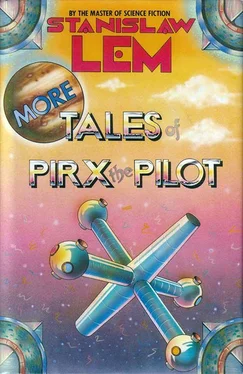He got the key from the porter and rode up to his room. He hadn’t looked at the plate yet and felt strange when he saw the number: 173. The same room he had stayed in, long ago, when for the first time he flew “that side.” But after opening the door he concluded that either this was a different room or they had remodeled it radically. No, he must have been mistaken, that other was larger. He turned on all the switches, for he was sick of darkness, looked in the dresser, pulled out the drawer of the small writing table, but didn’t bother to unpack; he just threw his pajamas on the bed and set the toothbrush and toothpaste on the sink. He washed his hands—the water, as always, infernally cold, a wonder it didn’t freeze. He turned the hot water spigot—a few drops trickled out. He went to the phone to call the desk but changed his mind: there was really no point. It was scandalous, of course—here the Moon was stocked with all the necessities, and you still couldn’t get hot water in your hotel room!
He tried the radio. The evening wrap-up—the lunar news. He hardly listened, wondering whether he shouldn’t send a telegram to the owner. Reverse the charges, of course. But no, that wouldn’t accomplish anything. These were not the romantic days of astronautics! They were long gone; now a man was nothing but a truck driver, dependent on those who loaded cargo on his ship. Cargo, insurance, demurrage… The radio was muttering something. Hold on—what was that?… He leaned across the bed and moved the knob of the apparatus.
“—in all probability the last of the Leonid swarm.” The soft baritone of the speaker filled the room. “Only one apartment building suffered a direct hit and lost its seal. By a lucky coincidence its residents were all at work. The remaining meteorites caused little damage, with the exception of one that penetrated the shield protecting the storerooms. According to our correspondent’s report, six universal automata designated for tasks on the construction site were totally destroyed. There was also damage to the high-tension line, and telephone communication was knocked out, though restored within a space of three hours. We now repeat the major news. Earlier today, at the opening of the Pan-African Congress…”
He shut off the radio and sat down. Meteorites? A swarm? Well, yes, the Leonids were due, but still the forecasts—those meteorologists were always fouling up, exactly like the synoptics on Earth. Construction site—it must have been that one up north. But all the same, atmosphere was atmosphere, and its absence here was damned inconvenient. Six automata, if you please. At least no one was hurt. A nasty business, though—a shield punctured! Yes, that designer, he really should have…
He was dog-tired. Time had got completely bollixed up for him. Between Mars and Earth they must have lost a Tuesday, since it went directly from Monday to Wednesday; that meant they also missed a night. “I better stock up on some sleep,” he thought, got up, and automatically headed for the tiny bathroom. But at the memory of the icy water he shuddered, did an about-face, and a minute later was in bed. Which couldn’t hold a candle to a ship’s bunk. His hand automatically groped around for the belts to buckle down the quilt, and he gave a faint smile when he couldn’t find them; after all, he was in a hotel, not threatened by any sudden loss of gravitation.
That was his last thought. When he opened his eyes, he had no idea where he was. It was pitch-black. “Tyndall!” he wanted to shout, and all at once—for no apparent reason—remembered how once Tyndall had burst terrified out of the cabin, in nothing but pajama bottoms, and desperately cried to the man on watch, “You! For God’s sake! Quick, tell me, what’s my name?” The poor devil was plastered; he had been fretting over some imagined insult or other and had drunk an entire bottle of rum.
In this roundabout way Pirx’s mind returned to reality. He got up, turned on the light, went to take a shower, but then remembered about the water, so carefully let out first a small trickle—lukewarm; he sighed, because he yearned for a good hot bath, but after a minute or two, with the stream beating on his face and torso, he actually began to hum.
He was just putting on a clean shirt when the loudspeaker—he had no idea there was anything like that in the room—said in a deep bass:
“Attention! Attention! This is an important announcement. Will all men with military training please report immediately to Port Control, Room 318, with Commodore-Engineer Achanian. We repeat. Attention, attention…”
Pirx was so astonished, he stood there for a moment in only his socks and shirt. What was this? April Fools’ Day? “With military training”? Maybe he was still asleep. But when he flung his arms to pull the shirt on all the way, he cracked his hand against the edge of the table, and his heart beat faster. No, no dream. Then what was it? An invasion? Martians taking over the Moon? What nonsense! Whatever it was, he had to go.
But something whispered to him while he jumped into his pants, “Yes, this had to happen, because you are here. That’s your luck, old man, you bring trouble…”
As he left the room his watch said eight. He wanted to stop somewhere and ask what the hell was going on, but the corridor was empty, and so was the escalator, as though a general mobilization had already taken place and everyone was scrambling God knows where at the front line. He ran up the steps; they were moving at a good clip to begin with, but he hurried as if he actually might miss a chance at derring-do. At the top he saw a brightly lit glass kiosk with newspapers and ran up to the window to ask his question, but there was no one to ask. The papers were sold by machine.
He bought a pack of cigarettes and a daily, which he glanced at without slowing his pace; it contained nothing but an account of the meteorite disaster. Could that be it? But why military training? Impossible! Down a long corridor he went toward Port Control. Finally he saw people. Someone was entering a room with the number 318, someone else was coming up from the opposite end of the corridor.
“I won’t find out anything now; I’m too late,” he thought as he straightened his jacket and walked in. It was a small room, with three windows; behind them blazed an artificial lunar landscape, the unpleasant color of hot mercury. In the narrower part of the trapezoidal room stood two desks, the entire area in front of them being crammed with chairs, evidently brought in on short notice, since almost every chair was different. There were around fourteen or fifteen people here, mostly middle-aged men with a few kids who wore the stripes of navy cadets. Sitting apart was some elderly commodore—the rest of the chairs remained empty. Pirx took a seat next to one of the cadets, who immediately began telling him how six of them had flown in just the other day to start their apprenticeship “that side,” but they were given only a small machine, it was called a flea, and the thing barely took three, the rest had to wait their turn, then suddenly this business cropped up. Did Mr. Navigator happen to know…? But Mr. Navigator was in the dark himself. Judging by the faces of those seated, you could tell that they, too, were shocked by the announcement—they probably all came from the hotel. It must have occurred to the cadet that he ought to introduce himself, because he started going through a few gymnastics, nearly overturning his chair. Pirx grabbed it by the back, and just then the door opened and in walked a short, dark-haired man slightly gray at the temples. He was clean-shaven, but his cheeks were blue with stubble; he had beetle brows and small, piercing eyes. Without a word he passed between the chairs, and behind the desk pulled down from a reel near the ceiling a map of “that side,” on a scale of one to one million. The man rubbed his strong, fleshy nose with the back of his hand and said, without preamble:
Читать дальше












